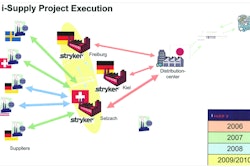
The British supply chain sector is in the midst of a skills shortage and, if it is to correct the issue, the industry must be prepared to break with convention and think outside the box when it comes to recruitment.
Traditionally, the recruitment process is treated as a checkbox exercise. Employers compile a set of standardized criteria for a specific role, and they attempt to match up a potential candidate based on the skills and experience which best match this.
On the surface, this method is tried and tested, however, what happens when the role you are recruiting for doesn’t yield an acceptable candidate? A niche position, for example, requires a niche candidate—if that candidate, despite having relevant skills and experience, doesn’t match up, do you employ them out of a lack of anything better or do you wait for something more suitable, increasing the workload on existing employees? Unfortunately, this seems to be the challenge facing the supply chain industry at present.
A report by the Confederation of British Industry (CBI) opened eyes to the importance of strengthening the British supply chain industry and identified the key areas for investment that would potentially generate a boost of £30 billion for the British economy. Following this, late last year, the Deputy Prime Minister announced plans to boost the manufacturing supply chain industry in 2015. With this in mind, it is now a priority for supply chain organizations to address skills shortages in order to mitigate the risk of spoiling what could be a significant boom in the sector.
For the organizations themselves, they must start thinking outside the box when it comes to recruitment because employing a set type of candidate, with a set range of skills is too restrictive and will ultimately cause a detriment to the future direction of an organization. Instead, the focus should be on employing professionals and graduates with specific skills and capabilities that meet clear business objectives.
To achieve this, organizations should look to expand the standard job descriptor, opening up potential positions to a much wider audience. Not only does this provide greater diversity, but it also adds to the culture of the business, enhancing the way it operates with a greater range of personality and thought processes.
Altering the way a business finds employees can be easier said than done in many cases and, when it comes to putting this process into practice, firms often gravitate to what they are used to and what they are familiar with when looking for candidates. However, new technology is at hand for these organizations to prevent them from getting stuck in a rut and suffering from these recurring issues.
Business toolkits are readily available within the marketplace and these provide objective analysis on people capabilities to ensure that the right people are in the right jobs. Using these strategic forms of technology gives organizations an advantage when it comes to selecting prospective candidates and enables them to understand fully what they need and, more importantly, what they don’t. Additionally, these toolkits can provide training and support for existing employees. By applying the same processes you would to a potential candidate, employers can also exercise this on current employees to identify existing skills gaps within an organization and which areas of development need to be addressed to meet specific company objectives, and therefore, skill employees for future roles within a business.
Investing in such processes will not only bring a greater diversity of staff with valuable skill sets, but it will also develop existing staff, ensuring skills shortages don’t become an issue in the future. In doing so, you not only help support the growth of the business, but also that of the supply chain industry, too.
















